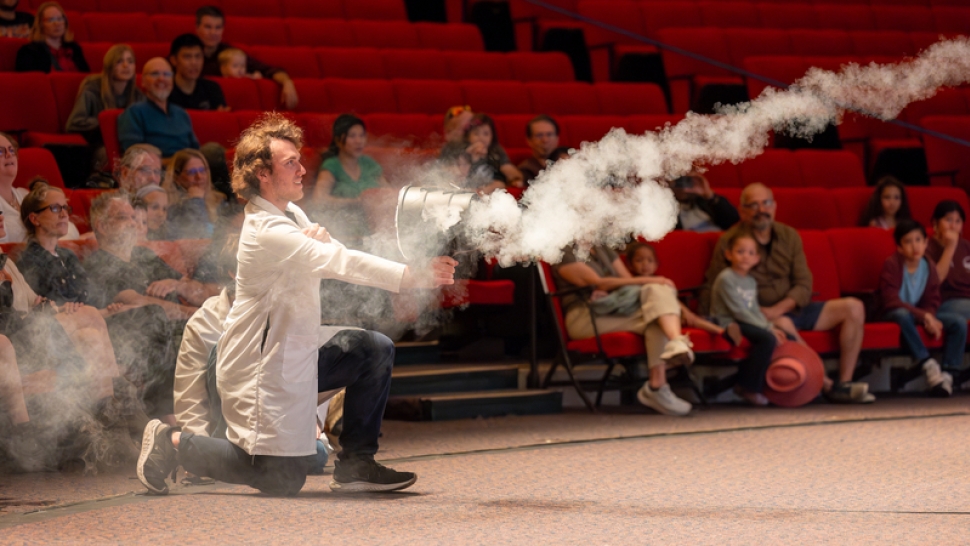
The law of inertia tells us a stationary object will remain at rest unless acted upon by an outside force.
So this year, when enough grassroots momentum built among Trinity students to resurrect a “Speaking Physics” course (shuttered the past two years) that lets students build, produce, and stage their own physics demonstrations, physics professor Nirav Mehta, Ph.D., felt a surge of new energy in a major way.
“This is an unconventional course that we reimagined after COVID to rebuild a bit of community within the department,” Mehta says. “There’s no set curriculum, but students get to choose what physical ideas they want to explore, even building and creating new demonstrations. Given a generous budget, we have been able to create some pretty incredible demonstrations.”
The culmination of the course is a fully-staged show, with multiple experiments that cover a gamut of different physics concepts and principles, all selected by students.
Mehta, now in his 14th year at Trinity University, conducts research in quantum theory, studying the collisions of atoms and molecules and their interactions with electric fields, laser fields, and beyond. But that doesn’t necessarily dictate what experiments his class will choose to build.
“I give the class a great deal of freedom in deciding what they want to explore,” Mehta says. “The real question of the class becomes, ‘What is it about physics that we love?’ I want students to rediscover that. And now, once they’ve done that, to learn how to explain it to somebody else.”
Students like Addison Wilberg ’26 and Andra Key ’25 get to design, craft, and hone the physical components for each experiment in Trinity’s Makerspace. This unique, all-in-one design and machine shop allows students of all majors to ideate and create with state-of-the-art tools and tech.
Wilberg, a physics major from New Orleans who wants to pursue a Ph.D., focused on optics in the class, specifically building a hologram. “Holography is the art of making holograms, which are really about encapsulating a 3D image on a 2D plate or film,” Wilberg says. “Building that has been a really fun journey.”
Key, an applied physics major from Austin, Texas, originally had her sights set on teaching, but is taking some time to reflect on her future.
“I love being on stage. I love presenting stuff, and doing physics demos just sounded like a bunch of fun,” she says.
Key worked with a partner on making a circuit to demonstrate some basic circuit principles in a very efficient way. “We’re just convincing people that if you flip this switch, this light bulb will be this bright, that kind of thing,” Key says. “We didn’t end up staging it for the show, but at least a couple of other Trinity professors have ended up using what we built in their respective classes, just to show students something that wasn't a PowerPoint.”
Improving communication skills has been a major boon of the course for both students, particularly Wilberg.
“I feel like I've always struggled with science communication,” he says. “So, I think that ‘Speaking Physics’ has been a twofold improvement for me: not just being able to comfortably talk in front of a large group of people, but also getting the main ideas out in a salient way for a broad audience.”
And for Key, the class has re-energized her love of the field, especially during a challenging senior year.
“I think ‘Speaking Physics’ has been a really good grounding point, especially when we have done our different outreach programs where we're talking to little kids. Showing them some of the more foundational stuff, that is exciting, and then we get to watch the kids be excited,” Key says. “I feel like this has rejuvenated my own excitement in some aspect.”
Mehta ultimately hopes the class will serve as a gateway into the world of physics, not a closed door.
“Physics doesn't have to be necessarily complicated with lots of jargon. If you can communicate a topic, a concept using everyday language and get it across, that’s something everyone can appreciate,” he says. “Here's a class that’s a real opportunity for us as a physics department to advertise to the rest of the community, ‘Hey, physics is pretty cool.’”